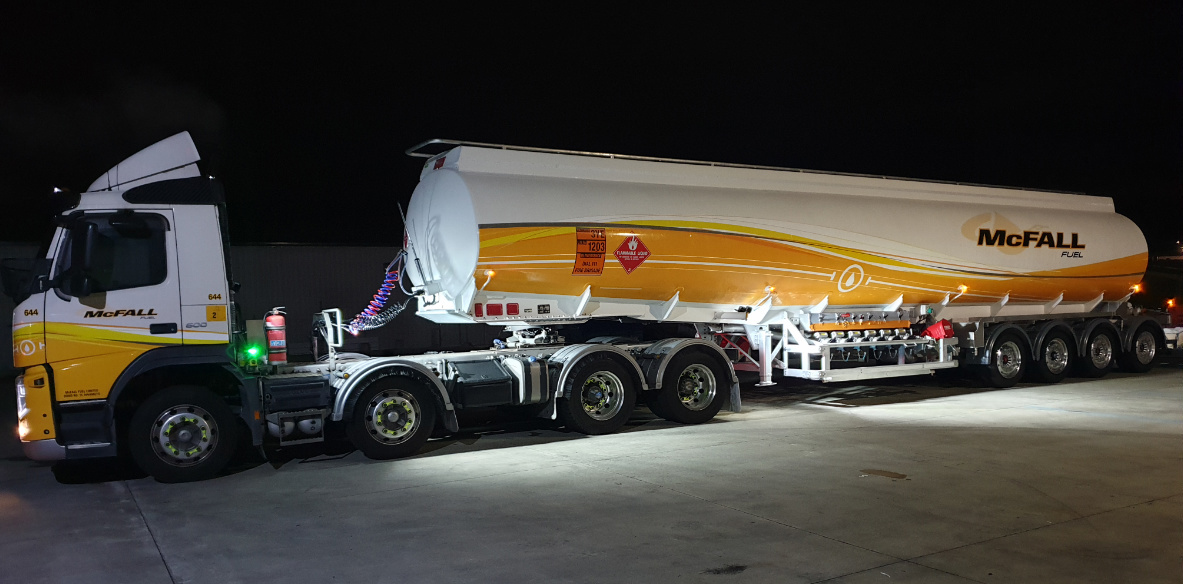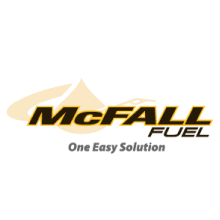
MCFALL FUEL
McFall Fuel standardises on Greentree post-merger

A merger is an ideal time for a growing organisation to review and validate the systems used to manage the company. That’s what McFall Fuel did when it joined forces with Rural Fuel in 2017; with different enterprise resource planning solutions in place at each company, the merger provided an opportunity to take the best in terms of processes from both organisations, while consolidating and standardising on the best system for the combined business. That system is MYOB Greentree, implemented, customised and supported by Verde Group; with the merger underway, the company opted to further optimise operations by introducing Greentree eDocs which largely eliminates onerous paperwork.
As a result, the company today enjoys visibility across its expanded operations, simplified invoicing for customers and a massive reduction in paperwork.
From a small, family-owned fuel delivery business set up in the 1980’s, McFall Fuel has rapidly grown into a large-scale operation, delivering fuel and lubricants to commercial and construction businesses, forestry crews, agricultural contractors, fishing boats, farmers, and several niche businesses throughout the central north island of New Zealand – from Orewa to Wellington, including the Hawkes Bay and the wider Taranaki region.
SITUATION
Management Accountant Mandy Joe says McFall Fuel is a long-term user of Greentree and has relied on the support and expertise of Verde Group since 2011. “With the merger with Rural Fuel, we needed to bring together two distinct business models and ways of operating; McFall’s traditional business sees larger trucks and high volumes with low numbers of transactions, while Rural Fuel delivers smaller volumes, but has many more transactions.”
Prior to the merger, the companies were similarly sized in terms of number of employees. Each company operated a different ERP system, with Rural Fuel relying on an accounting package, while McFall’s had in place the more sophisticated Greentree system. “Our business isn’t a ‘standard’ one, and that means our Greentree system is quite highly customised to meet our requirements. In the fuel business, the margins are slim – it’s a matter of cents per litre – so efficiency is absolutely top of mind.”
A merger presents multiple challenges, Joe notes. “From a systems perspective, most of what Verde has done for us throughout this process revolves around internal processes which we wanted to be consistent across both companies. But to be consistent, you must find out what’s different, first. And then you need to take the best from each operation and standardise that across the new whole.”
SOLUTION
Joe is enthusiastic about the insight and expertise that Verde Group brings to the table.
“Their knowledge of our business has again proven invaluable through this exercise. We found that a large amount of custom development was required in Greentree to standardise across the business and Verde went about it by picking off bits and pieces and making the development of an eventual complete companywide solution an iterative process.”
She says a lot of what was required surrounded reporting and information flow. “It’s not just about capturing information, but also presenting it in a suitable way for customers to consume it and also to meet our legislative requirements; with fuel, there are excises and customers are eligible for rebates, for which they need the right information,” she explains.
This information must be ‘auditable’ and in a format in which customers can complete their excise duty returns; Joe adds that the custom development already in place for McFall and which has now extended to the ‘Rural Fuel’ part of the business, also includes a loyalty programme and a specific process for fuel delivery.
“For the most part, the businesses were similar, in that they deliver fuel out of trucks, along with other sales such as various lubricants. We needed the inventory process to handle all transactions, while also accounting for different income streams and pricing models – such as fuel cards which customers can use at BP and GAS service stations around the country. And then Rural Fuel also had truck stops and retail sites, so we needed to capture all these transactions in Greentree.”
The consolidation, Joe says, was ‘huge’. “The company doubled. We took over 8,500 new customers into the system, imported 55,000 lines of customer information and went from a fleet of 40 or 50 trucks, trailers and utes, to over 100. There were a ton of new products in inventory and we had to standardise the financials, too.”
The merger also proved an ideal time to revolutionise paperwork and simplify invoicing for customers, including the consolidation of multiple items into monthly invoices rather than issuing an invoice for every transaction. For this, Greentree eDocs is used. “It’s very, very good,” says Joe. “IRD processes require records to be retained for 7 years. We’d done this with physical paper and have an enormous amount of it in steel containers on pallets; we literally used forklifts and I would climb in to find stuff when required.”
With eDocs, she says a few clicks of a mouse gets the same result. “There’s a massive reduction in paper. A massive reduction in cost. Probably 98 percent of our invoices come in by email anyway; it is tracked, with better controls, and now nothing ever gets lost, with Greentree maintaining a record of where, what and when everything is. It’s transformational; we’ve got our first ‘post eDocs’ audit coming up and I’m so excited about it.”
RESULTS
As a larger, more complex business today, Joe says the simple fact is that McFall Fuels wouldn’t be able to operate successfully without its Greentree system. “With the scale of the business today, and with the detail necessary on every transaction – remember, we operate on margins of cents per litre, and 5 or 6 cents treated the wrong way is the difference between profit or loss – there’s no way we could do without it.”
The biggest value, she adds, is increased efficiency and the amount of information that a companywide system puts at your fingertips. We operate across the North Island and any team member can instantly find what they need to get their job done.”
During the merger, she says there was opportunity to see how difficult things can be in the absence of an integrated solution. “We had a year of frustration while getting it sorted out: which customer belongs to what company, where’s the sales history, who knows these answers and where are they? It’s all a thing of the past, and as a result, we can serve customers better and faster.”
Joe says Greentree has proven itself a superior system once again through the Rural Fuel merger. “It’s stood the test of time and it scales very well to meet the transactional volumes we’re putting through; this is the second major merger we’ve done, after Direct Fuels in 2015, where we went from 40 staff to 75, and now we’ve gone from 70 to 140, so we knew it could cope.”
More importantly, she adds, Verde Group has proven its worth throughout the engagement. “We’ve discovered that there is no such thing as ‘no’ when it comes to our system. The team at Verde can always solve any issues or requests we put in. And that’s key in helping gain competitive advantage while meeting the needs of our customers,” she concludes.
ABOUT MCFALL FUEL
The Wilcox Group of Companies is involved with growing, packing and distributing fresh produce throughout New Zealand with facilities at Pukekohe, Ohakune, Levin and the Waikato in the North Island, and Rakaia in the South Island. Companies within the group are privately owned by the Wilcox family, who have been associated with vegetable growing since the early 1930s. They manage a production base of 2,500 acres with 110 permanent staff.Their large growing and packing capacity and specialised marketing skills mean Wilcox can deliver and maintain a guaranteed sustainable supply to retail sectors throughout New Zealand and sustain a significant export demand.
For more information visit A.S. Wilcox
McFall Fuel has rapidly grown into a large-scale operation, from a small, family-owned fuel delivery business set up in the 1980's. McFall Fuel is now delivering fuel and lubricants to commercial and construction businesses, forestry crews, agricultural contractors, fishing boats, farmers, and a number of niche businesses throughout the north island of New Zealand – from Warkworth to Wellington and everywhere in between.
For more information visit McFall Fuel

